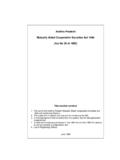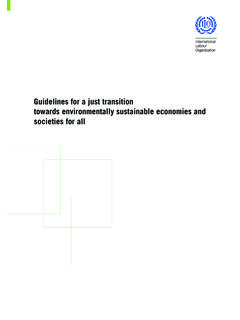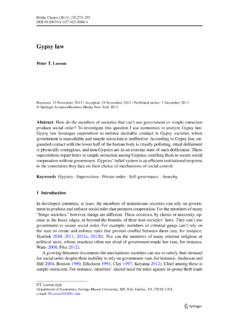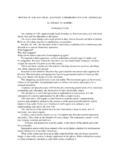Transcription of Maternal Health - WHO
1 Maternal Health : Investing in the Lifeline of Healthy societies & EconomiesPolicy Brief September 20101 Maternal Health :Investing in the Lifeline of Healthy societies & EconomiesAfrica Progress PanelPolicy BriefSeptember 2010 Maternal Health : Investing in the Lifeline of Healthy societies & EconomiesPolicy Brief September 20102 frica Progress Panel Maternal Health : Investing in the Lifeline of Healthy societies & EconomiesPolicy Brief September 2010 EXECUTIVE SUMMARYOne woman dies per minute in childbirth around the globe. Almost half of these deaths occur in Sub-Saharan Africa. Despite the progress made in many countries in increasing the availability of Maternal healthcare, the majority of women across Africa remain without full access to this care.
2 Countries face a variety of obstacles to improved Maternal Health : insufficient data prevents ministries from implementing programmes most effectively, while cost and other access issues prevent women from using the available resources. There are known, cost-effective interventions that can dramatically reduce Maternal mortality. Investing in Maternal Health is a political and social imperative, as well as a cost-effective investment in strong Health systems overall. Three key approaches can considerably improve the Health of women in Africa: maximizing services of Health workers; efficient financing mechanisms; and building political Health worker (CHW) programmes can improve Maternal Health , and have successfully reduced Maternal mortality in both Ethiopia and Nepal.
3 CHWs are instrumental in providing healthcare to underserved populations, particularly in rural areas, with few healthcare facilities. CHWs can improve Maternal Health more cost-effectively and reach more of the population if given the proper tools, such as mobile phones, bicycles and delivery governments continue to explore and implement different cost-effective strategies to finance Maternal Health in their countries. Countries have provided subsidies, abolished user fees, implemented national and community Health insurance schemes, utilized performance-based financing and built partnerships to improve Maternal Health .
4 While donors can provide much-needed funding, it is important for countries and donors to work together to ensure that programmes are cost-effective and in line with national priorities. Governments must also harness the power of the private sector to improve Maternal will and strong leadership make innovative, cost-efficient interventions possible. Because women are often marginalized economically, politically and socially, sustained leadership on gender equality is required to advance Maternal Health . Strong leadership at the highest levels promotes accountability within ministries and enables them to find reliable partners to drive and champion progress in Maternal in Maternal Health is a wise Health and economic policy decision.
5 Women are the sole income-earners in nearly one third of all households globally. There are spill-over macro-economic benefits from the women whose lives are improved by Maternal Health interventions. Many Maternal -care interventions are proven to be both effective in reducing Maternal death and cost-effective, especially for high-risk groups. Some of these interventions are cost-saving, yielding returns of investment of over 100 per cent. Maternal Health : Investing in the Lifeline of Healthy societies & EconomiesPolicy Brief September 2010 Maternal Health : Investing in the Lifeline of Healthy societies & EconomiesPolicy Brief September 20103 CONTENTSF oreword 4 Introduction 5 Maternal Health : Barriers to Success 7 Cost 7 Access 8 Infrastructure 9 Quality and Sustainability of Care 9 Information Deficit 10 Attitudes 11 Key Approach 1.
6 Addressing Cost, Access and Information Barriers 12 Increased Budgets for Maternal Health 14 Health Systems Interventions-Community Health Workers 14 Community Health Worker Tools for Success 15 Key Approach 2: Efficient Financing Mechanisms 16 Subsidies and Payment Exemptions 16 Health Insurance Programs 18 Donor Funding 20 Harnessing the Power of the Private Sector 21 Key Approach 3: Political Partnerships 21 Why Invest in the 3 Key Approaches? Weighing the costs and benefits of investing in Maternal Health 23 Cost-Effectiveness 23 Health Workers and Health Systems 24 Healthy Mothers, Healthy Economies and societies 24 Healthy Mothers, Healthy Systems 25 Healthy Mothers.
7 A Global Priority 25 Effective Investment 26 Conclusion & Call to Action 27 Recommendations 28 What African Governments and Policymakers need to 28 What the International Community needs to 29 What the Private Sector needs to 30 Notes 31 Maternal Health : Investing in the Lifeline of Healthy societies & EconomiesPolicy Brief September 20104 frica Progress Panel Maternal Health : Investing in the Lifeline of Healthy societies & EconomiesPolicy Brief September 2010 Maternal Health is not a women s issue.
8 It is about the integrity of communities, societies and nations, and the well-being of all the men, women, boys and girls whose own prospects in life depend upon healthy women and mothers. Maternal Health is not only needed as a basis for social harmony and economic productivity; it also reduces costs and burdens to families, communities, service providers and the Treasury. Smart investments in Maternal Health strengthen Health systems overall, and increase cost-effectiveness of resources allocated to the Health believe that investing in Maternal Health makes compelling political and economic sense.
9 Failure to invest in Maternal Health is not only irresponsible and immoral; it is also deeply counterproductive, undermining national growth and development. This report recommends what can and must be done if Africa is to end the unnecessary death of millions of African women. It is simply unacceptable that so many women are dying. Nearly 50 per cent of all Maternal deaths in the world happen in Africa, which has only 15 per cent of the world s and childbirth are all too often a cruel and harsh lived experience for Africa s women, particularly the poor and women in rural areas.
10 Almost 75 per cent of women who die in childbirth would be alive if they had access to the interventions for preventing pregnancy and birth policy brief is intended to complement the efforts of Maternal Health advocates in government, civil society and the development community by making the case for why urgent action to reduce Maternal mortality must be a top priority for African leaders, including Ministers of Finance and the private sector. It recommends policy interventions and considers mechanisms to help with the financing of Maternal Health in reducing Maternal mortality is dependent on and can accelerate progress on wider issues such as nutrition, education, and sexual and reproductive rights, including access to comprehensive voluntary family planning.
















